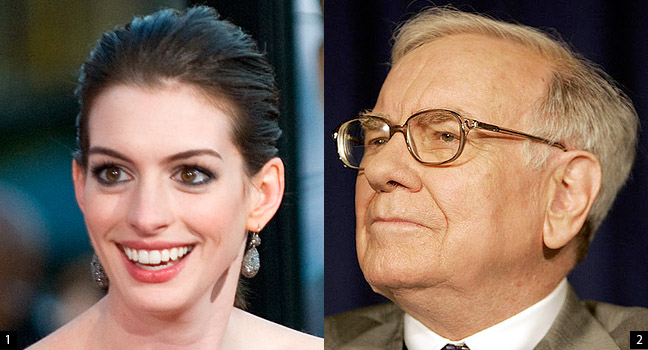Does Anne Hathaway News Drive Berkshire Hathaway's Stock?
Given the awesome correlating powers of today's stock trading computers, the idea may not be as far-fetched as you think.

A couple weeks ago, Huffington Post blogger Dan Mirvish noted a funny trend: when Anne Hathaway was in the news, Warren Buffett's Berkshire Hathaway's shares went up. He pointed to six dates going back to 2008 to show the correlation. Mirvish then suggested a mechanism to explain the trend: "automated, robotic trading programming are picking up the same chatter on the Internet about 'Hathaway' as the IMDb's StarMeter, and they're applying it to the stock market."
The idea seems ridiculous. But the more I thought about the strange behavior of algorithmic trading systems and the news that Twitter sentiment analysis could be used by stock market analysts and the fact that many computer programs are simply looking for tradeable correlations, I really started to wonder if Mirvish's theory was plausible.
I called up John Bates, a former Cambridge computer scientist whose company Progress Software works with hedge funds and others to help them find new algorithmic strategies. I asked, "Is this at all possible?" And I was surprised that he answered, roughly, "Maybe?"
"We come across all sorts of strange things in our line of business, strange correlations," Bates told me. "And I've had a lot of interest in this for a long time because it's really often the secret source for certain hedge funds."
Companies are trying to "correlate everything against everything," he explained, and if they find something that they think will work time and again, they'll try it out. The interesting, thing, though, is that it's all statistics, removed from the real world. It's not as if a hedge fund's computers would spit the trading strategy as a sentence: "When Hathway news increases, buy Berkshire Hathaway." In fact, traders won't always know why their algorithms are doing what they're doing. They just see that it's found some correlation and it's betting on Buffett's company.
Now, generally the correlations are between some statistical indicator and a stock or industry. "Let's say a new instrument comes to an exchange, you might suddenly notice that that an instrument moves in conjunction with the insurance sector," Bates posited. But it's thought that some hedge funds are testing strategies out to mine news and social media datasets for other types of correlations.
Does it happen a lot? Bates doesn't think so, but it's not out of the question. And, in any case, we're going to see a lot of strange trading strategies as hedge fund managers' computing resources grow ever more powerful and they are actually able to "correlate everything against everything." Oh, it's raining in Kazakhstan? Buy pork bellies in Brazil! And sell wheat in Kansas! Dump Apple stock! Why? Because the computer says that the 193 out of the last 240 times it rained in Kazakhstan, pork bellies in Brazil went up, and wheat prices and Apple shares went down.
It sounds crazy, sure, but they're the ones making 10 figures.
Images: 1. Anne Hathaway. Flickr/zigzaglens; 2. Warren Buffett. Flickr/trackrecord.